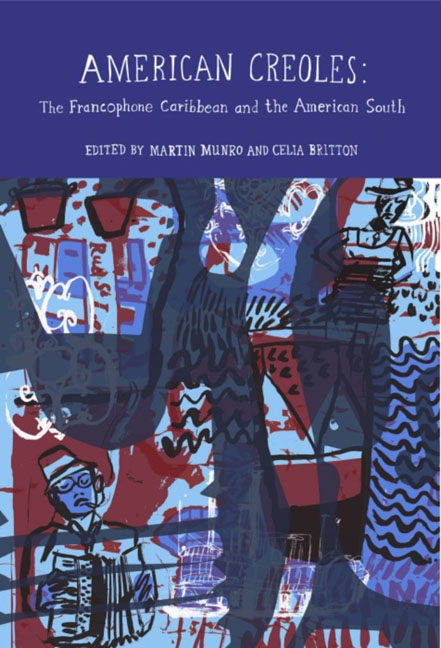Book contents
- Frontmatter
- Contents
- List of Illustrations
- Acknowledgements
- Introduction
- Creolizations
- Lafcadio Hearn's American Writings and the Creole Continuum
- Auguste Lussan's La Famille créole: How Saint-Domingue émigrés Became Louisiana Creoles
- Caribbean and Creole in New Orleans
- Creolizing Barack Obama
- Richard Price or the Canadian from Petite-Anse: The Potential and the Limitations of a Hybrid Anthropology
- Music
- Intertextualities: Faulkner, Glissant, Condé
- Notes on Contributors
- Index
Caribbean and Creole in New Orleans
from Creolizations
- Frontmatter
- Contents
- List of Illustrations
- Acknowledgements
- Introduction
- Creolizations
- Lafcadio Hearn's American Writings and the Creole Continuum
- Auguste Lussan's La Famille créole: How Saint-Domingue émigrés Became Louisiana Creoles
- Caribbean and Creole in New Orleans
- Creolizing Barack Obama
- Richard Price or the Canadian from Petite-Anse: The Potential and the Limitations of a Hybrid Anthropology
- Music
- Intertextualities: Faulkner, Glissant, Condé
- Notes on Contributors
- Index
Summary
While most of the United States has historically been dominated by a ‘black/white’ racial binary, New Orleans – as well as many other parts of Louisiana – has long been shaped by a tripartite division that included a thriving community of free people of colour who were socially in-between and distinct from enslaved blacks and free whites. This division was nurtured by Louisiana's Spanish and French colonial rulers and then significantly reinvigorated by the migration of nearly 10,000 refugees from the Haitian Revolution, who fled their first refuge in eastern Cuba to settle in New Orleans in 1809. In the research discussed here I examine how these historical ties to the Caribbean continue to shape the way many in New Orleans understand their culture and describe their racial and ethnic identification. I argue that in order to understand its racial and ethnic present, New Orleans must be examined within the larger history and context of the Americas.
This research is based on three years of ethnographic research and thirtyseven in-depth interviews with genealogists who have Louisiana Creole ancestry that extends back to Saint-Domingue/Haiti. I have chosen to work with genealogists because genealogical research encourages participants to investigate the intersection between public histories and personal identities (see Hareven, 1978; Ball, 1998; Hall, 1998; Tyler, 2005). Because individuals with Creole ancestry are a cultural minority within the larger US community, remembering the ancestors either through informal recounting at family gatherings or through carefully documented research serves to keep alive a unique and distinctive history that is little known among those outside of the group. Despite the importance of genealogical activity for many Creoles, however, there is no ethnographic work that directly explores the question of how this activity informs the maintenance of Creole identities.
Listening to the stories of these genealogists has also made it possible to examine how individuals incorporate regional histories and cultures into their understandings of who they are. It is especially important to understand this process within regions of the United States that have a significant historical relationship with other regions in the circum-Caribbean. Paying closer attention to the transnational history and character of many US regions may inform and potentially transform our public debates about what it means to be ‘American’.
- Type
- Chapter
- Information
- American CreolesThe Francophone Caribbean and the American South, pp. 56 - 76Publisher: Liverpool University PressPrint publication year: 2012

